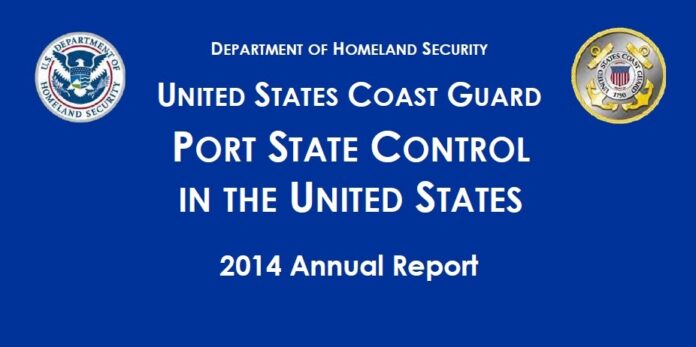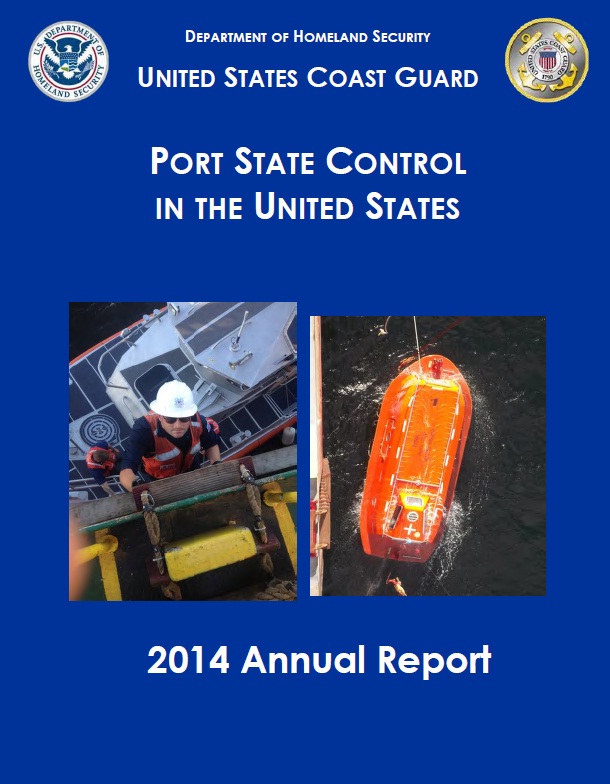
The report provides key statistics related to enforcement of international requirements with regard to foreign flag vessels calling in US ports.
Click image below to download full report.
Brief analysis shown further below.

Vessel Arrivals and Examinations Decreased, Detentions Increased
In 2014, a total of 9,227 individual vessels, from 83 different Flag Administrations, made 79,091 port calls to the United States. The Coast Guard conducted 9,232 SOLAS safety exams and 8,562 ISPS exams on these vessels. The total number of ships detained in 2014 for environmental protection and safety related deficiencies increased from 121 to 143. The total number of ships detained in 2014 for security related deficiencies increased slightly from 8 to 10.
Flag Administration Safety Performance
Flag Administration safety performance for 2014 decreased from the previous year, with the overall annual detention rate increasing from 1.29% to 1.55%. In addition, the three-year rolling detention ratio increased slightly from 1.11% to 1.31%. The Flag Administrations of New Zealand, Peru, and the Philippines were all removed from our Targeted Flag List. We also note that vessels from the Flag Administrations of Curacao, Anguilla, Kiribati, and Malaysia are potentially qualified for our QUALSHIP 21 Program and their vessels will be entered into the program, contingent upon the Administration and the vessels meeting other required criteria.
Flag Administration Security Performance Continues Improvement
Flag Administration security performance for 2014 slightly decreased from the previous year, with the Coast Guard annual Control Action Ratio (CAR) increasing from 0.09% to 0.12%. However, the three-year rolling average CAR has dropped from 0.12% to 0.10%, representing the lowest three-year security detention ratio we have ever recorded. Additionally, the Flag Administrations of Turkey and Saint Vincent and The Grenadines were removed from our targeted matrix. Due to the overall excellent Flag Administration security compliance performance, we will maintain the targeting point level for the Flag Administration Control Action Ratio at 1.50%.
Leading detentions
In 2014 the top three areas for detainable deficiencies remain the same from last year with ISM, MARPOL Annex I, and Fire Fighting Appliance deficiencies leading the way. In most cases with ISM, it was clear that the master and crew were either not familiar with ISM requirements or failed altogether to properly conduct required maintenance of the ship’s equipment in accordance with the procedures in their system. On MARPOL deficiencies, we continued to find crews intentionally disabling required pollution prevention equipment (such as bypassing oily water separators), failing to conduct proper maintenance, or were not knowledgeable in proper equipment operation. A large number of fire fighting-related detentions were still attributed to Fixed Water-Based Fire Fighting Systems and Quick-Closing Valves that had been disabled. Others items included fire pumps, along with emergency fire pumps, that were either inoperative or operated with insufficient pressure.













USCG report looks accurate as many ships are violating MRPOL and ISM regulations I'm 25 years experience of working on ships and I know how badly ships are managed but agencies other than ship crew are also to be blamed.
First of all I would like to highlight inefficiency during ship building. Ships are built with a view to spend minimum money with this mindset many things are compromised I.e
sea water pipe lines are chosen from very low grade steel which results in sea water leakages in engine room and putting pressure on ship crew to pump water overboard by passing oily water separator and causing water pollution